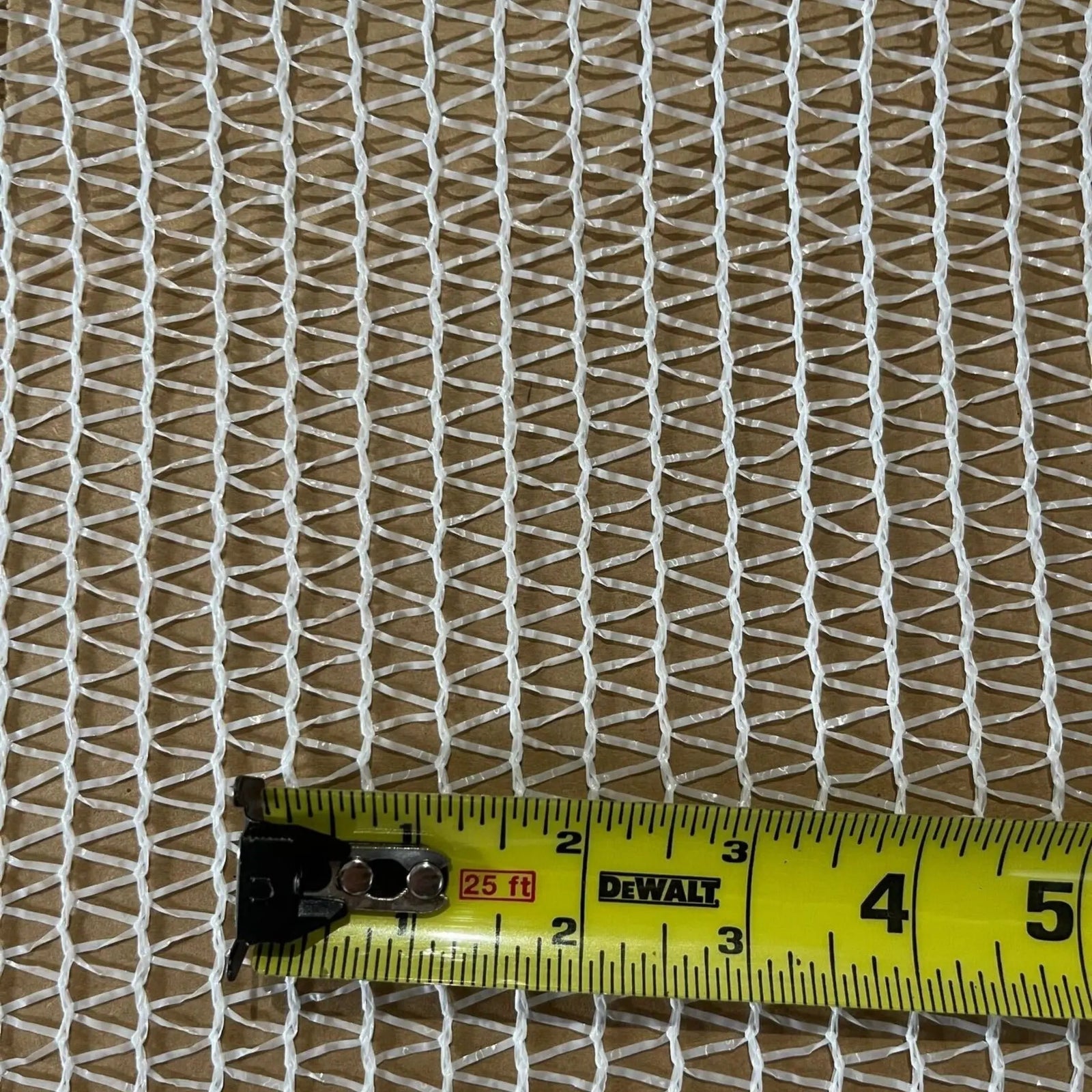

Greenhouse Shade Cloth - 30% White
Please note that we will not be restocking this greenhouse shade cloth. If you don’t see the size you need, we recommend our 30% White Mono Filament Shade option.
WHITE GREENHOUSE SHADE CLOTH
Our greenhouse shade cloth is UV stabilized, rot and mildew resistant, and has an 8-year warranty with a 16-year life expectancy. Shade cloth is an important component of your greenhouse to keep your plants safe during the intense summer heat.
WHY DO I NEED SHADE CLOTH?
Shade cloths protect the plants with light diffusion and UV protection. They also help to keep your greenhouse cool, improve plant ventilation, reduce water usage, and help to prevent sunburn on plants.
What Size of Shade Cloth Should I buy?
You will want the cloth to cover from hip to hip on your hoop house or cover loosely over the desired area that needs protection. Install clips to secure the shade cloth every 24-36". Shade cloth can also be installed using lock channel and spring wire. Check out this video tutorial on how to add shade cloth to a high tunnel greenhouse.
Here are some quick conversions based on Bootstrap Farmer Greenhouse kits -
(Match Length of Shade Cloth with Length of Structure)
| Hoop House Width | Shade Cloth Width Recommendation |
| 10' | 20' |
| 11'4 |
20' (20' for Gothic) |
| 12' | 20' |
| 14' | 20' (32' for Gothic) |
| 20' | 32' (42' for Gothic) |
| 30' | 42' |
WHAT PERCENTAGE SHADE CLOTH SHOULD I BE USING?
Need help determining which % shade cloth to get?
Choose shade density based on climate, plant's light needs, and heat sensitivities.
| 30% | Northern Zones - Mixed Vegetables |
| 50% | Southern Zones & Tomatoes, Lettuce, Mixed Crops |
30% (left) vs. 50% (right)

FEATURES
- White polyethylene, monofilament knitted fabric
- 8 Year Warranty & 16 Year Life Expectancy
- 30% Shade
- 70% Light Transmittance
- U.V. Treated
- Mold & Mildew Resistant
- Attachment clips not included
- Will not unravel when cut.
SHIPPING VIA MOTOR FREIGHT (SEMI)
Rolls over 120 lbs. must ship via motor freight. We will notify you if your order requires this shipping method. Click here for information about freight delivery.
Free shipping on orders over $75 to Contiguous US
Shipping Policy
Most products will ship from our facility in 1 to 2 business days after the order is placed. Express shipments placed after 12PM EST will be shipped out next business day. Full details can be found on our Shipping Policy Page
Returns Policy
Returns can be made on most products within 30 days of purchase. After 30 days we unable to offer a refund or exchange. Certain products are non-returnable. For full details visit our Returns Policy
QUESTIONS & ANSWERS
Ask a Question-
Do these have a hem around the edges?
They do not have a hem but they have a finish knit. This finish knit prevents them from unraveling.
-
Is this fabric made with virgin or recycled plastic?
It's virgin plastic.
-
can you speak to white vs black shade cloth
Hi there,
below is a detailed excerpt from our shade cloth listing. This should help!
WHAT COLOR SHADE CLOTH IS BEST?
Whether you choose black or white colored shade fabric or go with Aluminet will depend on several factors. Your location, the crops you are growing, daytime to nighttime temperature swings, and the desired effect of your shade cloth will all influence the appropriate fabric choice for your farm or garden.
-White shade cloth reflects light and heat, making for a cooler environment for the plants. White shade fabric is better suited for warmer climates as it protects against excessive heat and as such keeps flowering and fruiting plants producing during hot weather. In high temperature areas of the country like Texas and other southern states, white shade cloth will offer greater protection than black.
-Black shade cloth absorbs light while also blocking excess light. It does absorb heat and can act a bit like a radiator as the heat absorbed by the cloth if placed close to the plants, can be transferred to the growing crops. Black shade cloth is better for those growing heat-loving crops such as tomatoes and peppers and those in colder climates that benefit from more solar gains in the shoulder season. In some regions where extra heat is undesirable black may not be the best choice.
-Aluminum coated shade cloth, often called Aluminet, also does a great job at reflecting light, but where it shines is in light diffusion. It reflects light and heat similar to white colored shade cloth and also increases full spectrum light diffusion under the cloth.
The use of this shade cloth can also help with nighttime temperatures as it acts as a thermal blanket. In this way, it helps protect plants from wide temperature swings in regions where the daytime and nighttime temperatures are dramatically different. It is also a great choice for retaining heat in heated structures overnight when installed inside of the structure rather than over the top of the greenhouse.

